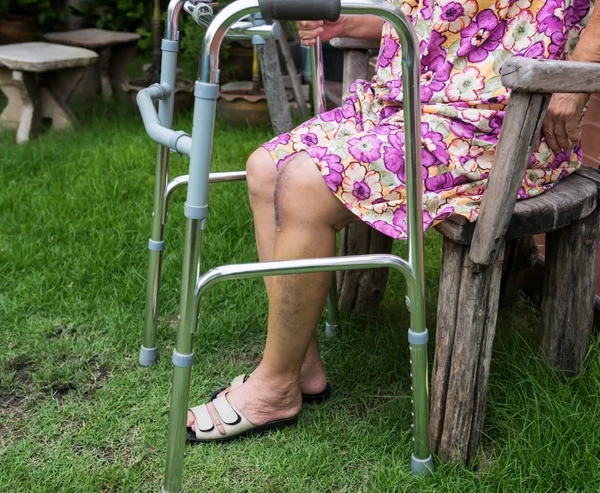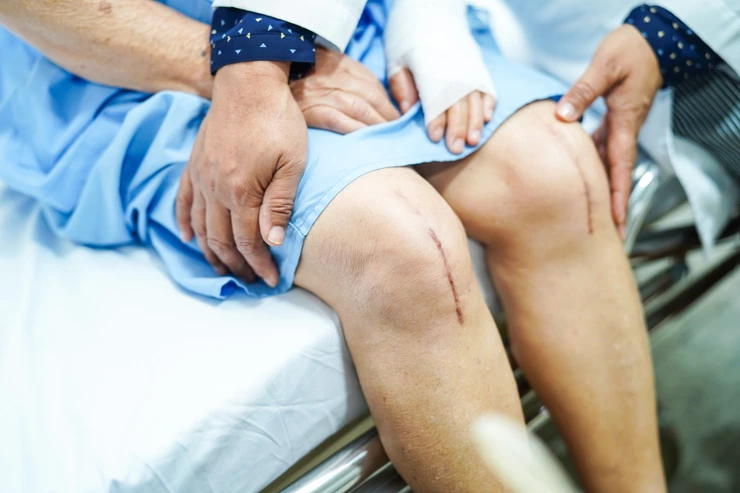Week by Week Guide for Knee Replacement Recovery
Many adults suffer from knee pain as they grow older and their joints start to “wear out.” Most commonly, this pain is caused by osteoarthritis. Fortunately, technology continues to be amazing! These days, total knee replacement surgery is a common procedure, even for the elderly. An artificial joint made of polymers, high-grade plastics, and metal alloys replaces the worn-out joint in knee replacement surgery. More than half of a million individuals undergo knee replacement surgery each year, and the replacement joint can last up to 15 years.
Risks of Knee Replacement Surgery for Seniors
The risks involved with knee replacement in older adults are relatively few, with only about 8% of senior patients experiencing knee surgery complications. It doesn’t last very long. When they do, it is post-surgery, and it is usually nausea and vomiting as a reaction to the anesthesia. If you are considering knee replacement surgery, discuss all of your current medications with your surgeon.
Blood clots happen more often after orthopedic surgeries, such as total knee replacements, than other types of surgery. However, they are usually preventable. Your doctor may prescribe blood thinners, tell you to keep your legs elevated, and wear support stockings. According to Swavely-Verenna (2021), less than 3% of patients experienced blood clots post-surgery.
Other risks, which are less likely to happen, include allergic reactions and infection. On rare occasions, allergic reactions to metals have been reported, but most people know if they are allergic to certain metals before surgery. If you follow your orthopedic doctor’s instructions after surgery and keep the wound clean, you can significantly reduce the chances of infection.
Recovery Time for Knee Replacement Surgery for Older Adults
Knee replacement recovery starts almost immediately after waking up from the surgery. On the same day, a physical therapist will help you stand up. You will most likely only be in the hospital for two to three days. Your treatment plan will go home with you and include physical therapy at home or an outpatient rehab center.
After the first month, you should notice the swelling going down and your ability for movement increase. You will work with your physical therapist for six more weeks, building your muscles around your new knee joint and increasing your range of motion. Don’t try to rush it! Rushing can impede your recovery process. Rather than getting you up and going, you can take longer to recover. It can take up to four months for seniors to recover after a total knee replacement.
Home Recovery after Knee Replacement Surgery Tips

Have a plan. Successfully recovering from a total knee replacement takes continued effort and time. With a well-thought-out plan, you can schedule caregivers for assistance with everyday activities of daily living ahead of time. It will lower the stress levels during your recovery and for your family members.
Tip #1: Safety first. If you fall during your recovery period, it can drastically make it longer.
- Modify your home with assistive devices and clear paths to reduce your risk of falling.
- Put everything you need to be comfortable on the bottom (main) floor.
- Place a shower chair in your shower.
- Make sure stairways are clear of any clutter.
- Most insurance companies cover raised toilet seats and safety bars.
- Make sure you have a comfortable chair that you can get out of easily.
- Make sure there are no loose rugs or cords to prevent tripping.
- Arrange for a ride home from the hospital.
- Arrange for someone to ensure you have all you need, including medications, a phone, and fluids within reach
Tip# 2 Pain and Infection Management
You will probably already be on pain medication before getting home, so it is essential to stay on track. You may also be prescribed stool softeners and antibiotics. If you manage your pain and monitor for infection carefully, you will be able to move sooner and more comfortably. Move as frequently as you can and stick to your rehab exercises for a faster recovery time. Caregivers can assist you with
- Monitoring for infection
- Reminder when it is time to take your medications
- Picking up prescriptions from the pharmacy
Tip# 3 Proper Nutrition
Eating healthy provides your body with the healing energy it needs to recover. You will be very busy in the days following surgery and may not have the energy or time to make fresh meals. Plus, you will be moving about much slower. Ensure you are eating nutritionally by planning.
Tip# 4 Exercise
Work on maintaining a balance between staying active and not overdoing it. It would be best to keep moving after you come home from surgery. As each day goes by, you will notice your ability to move around, and exercise is gradually getting easier.
Your helpers can assist you with:
- Taking walks together
- Following through with your physical therapy
- Managing household chores
Week by Week Guide for Knee Replacement Recovery

Weeks 1-3
When you leave the hospital, you will be expected to sit and stand without assistance and be able to walk using crutches or a walker.
You may need assistance at home with:
- Meal preparation
- Running errands
- Showering(a shower chair is recommended)
- Exercising
- Going to the doctor
- Filling prescriptions
- Dressing
Weeks 4-6
You will very likely see improvement by this point in your recovery. Your knee should be getting stronger, and you should be able to bend it better. Your physical therapist may increase your exercises and work with you on walking without a walker or crutches.
At this stage, you will start feeling like your old self. You may be able to start going places, cooking, and cleaning. Driving is not yet recommended.
You may still need assistance with:
- Driving to doctor’s appointments
- Exercising
- Grocery shopping and lifting
Weeks 7-12
Once having made it to week 7, you are most likely feeling almost back to normal. Hopefully, you can walk on your own, drive, shop, and start light housekeeping. The most important thing is to stick to your rehab treatment plan. This will continue to strengthen the muscles around your knee.
You may benefit from assistance with:
- Sticking to your exercise rehab plan
- Regular support from friends, family, and personal caregivers keep you motivated
Alternatives to Knee Replacement for Older Adults
If you are not quite sure you are ready for knee replacement surgery, there are other ways you can increase movement and reduce pain. The first thing to consider is weight loss, as is with many health conditions. Healthline.com (2022) reported that every 10 pounds extra you carry increases your chances of developing arthritis in your knees by 36%. Tai-chi, yoga and other low-impact exercises can be easy and helpful for older adults.

Over-the-counter and prescription medications, acupuncture, physical therapy, and steroid injections are some of the other alternatives. A less invasive arthroscopic surgery could also be used to repair cartilage and remove bone fragments.
All in all, getting a total knee replacement is effective and safe. It is effective for pain relief and can give you back a great deal of independence.


